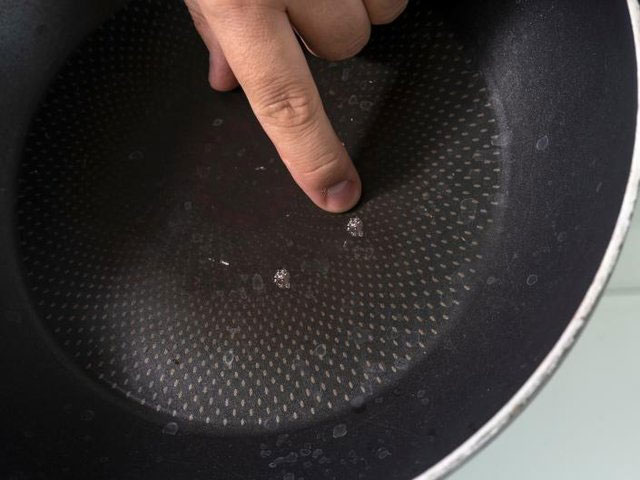A recent study reveals the extent to which tiny plastic particles can seep into our food after contact with cooking utensils. A small crack in a Teflon-coated pan can release up to 9,100 microplastic particles.
Non-stick pots and pans are extremely common kitchen tools in every household. They allow us to cook food easily without worrying about it sticking to the bottom of the pan during frying. The Teflon coating was discovered in 1938 by scientist Roy Plunkett. Teflon’s non-stick properties include corrosion resistance, heat tolerance, and a smooth surface that prevents sticking.
Teflon is a durable organic compound that decomposes at high temperatures above 300 – 400 degrees Celsius. Typically, cooking temperatures range from 130 – 190 degrees Celsius. However, non-stick coatings do not last indefinitely; they can easily become scratched over time due to cooking and washing.

Non-stick pots and pans are extremely common kitchen tools in every household.
A recent study has shown a staggering number of microplastic particles can seep into our food when it comes into contact with Teflon-coated cooking utensils. The research examined microplastics (defined as particles smaller than 5 mm or 0.2 inches) and nanoplastics (which are millions of times smaller), concluding that we may be absorbing a significant amount of microplastics over time.
However, assessing how many microplastics are released each time we cook and wash these kitchen items is quite challenging.
Youhong Tang, a mechanical and materials engineer from Flinders University in Australia, stated: “This serves as a strong warning that we must be careful in choosing and using cooking utensils to avoid contaminating our food.”
In an effort to assess the risks, the research team utilized Raman imaging techniques to study microplastics and nanoplastics on Teflon coatings at the molecular level through photon scattering. They also applied predictive algorithms to calculate the amount of this coating that could be dislodged and seep into food.
The results showed that a small scratch on a Teflon-coated non-stick pan could release up to 9,100 microplastic particles. For heavily scratched pans, they could release around 2.3 million microplastic particles in just 30 minutes of cooking on a hot stove.
More concerning is the fact that the non-stick Teflon coating (or Polytetrafluoroethylene) and polyfluoroalkyl substances (PFAS) belong to a group of “forever chemicals” that are highly toxic to the environment and human health. PFAS can accumulate over time in the human body, soil, water, and air, and are not biodegradable.
While there are still questions about the prevalence and dangers of the release of microplastics and nanoplastics, researchers are calling for further investigation into the potential contamination effects during cooking.
In parallel, scientists recommend that home cooks regularly replace old pots and pans, especially all Teflon-coated kitchen utensils that have been used for an extended period. Because even if the coating is not scratched, frequent heating can still cause millions of microplastics to be released.


















































